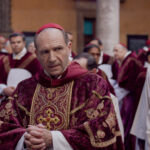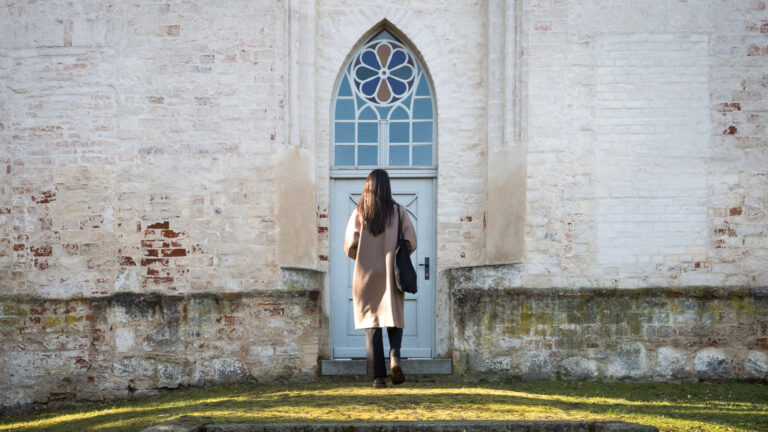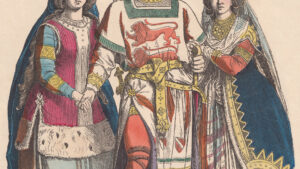I was a few weeks into my freshman year at Wheaton College on September 11, 2001. It was at breakfast that morning in the dining hall, Anderson Commons, when I first heard people anxiously talking about something happening in New York City. Little did I know that events playing out in the sky that very moment—hundreds of miles east—would lead to a renaming of the building I sat in. In 2004, Anderson Commons became part of the Todd M. Beamer Center, named for the Wheaton alumnus (’91) who was one of the heroes of United Flight 93.
I went back to my Traber dorm room after breakfast and turned on my little antenna TV, watching in horror as The Today Show aired live images of the Twin Towers on fire, with gaping holes exuding terrible black smoke. The startling images triggered an immediate thought, which grew as the day’s surreal events progressed: “This is like something out of a movie.”
Indeed, for my generation—raised on movies like Independence Day (1995) and Air Force One (1997), and with still-fresh memories of broadcast traumas like the Oklahoma City bombing and Columbine—imagery of urban calamity and terrorism had already formed a prism through which something like 9/11 could be understood.
Pop culture has an interesting relationship with real life. It helps us make sense of real events—unpacking their meaning and significance sometimes years or decades after they occur—and it is changed by real life. Historical fact and cultural narratives are intertwined, informing and shaping each other.
September 11 was the most significant news event of my lifetime. It also coincided with the start of my career as a writer about pop culture. In the fall of 2001 I started publishing my first movie, music, and TV reviews as an arts and culture writer for The Wheaton Record.
I’ve continued writing about culture in the two decades since—and I’ve grown in my conviction that careful analysis of pop culture is enlightening and instructive for Christians. The cultural artifacts produced in any given place and time reveal the longings, fears, idols, and spiritual orientations of that context. They also bear witness to the fact that imager-bearers of God have the capacity to bring order out of chaos and produce beauty and sense out of the ugliest realities and most senseless tragedies—like 9/11.
How Pop Culture Depicted—And Was Changed by—9/11
Much has happened in the two decades of pop culture since 9/11/01. What follows are just a few reflections on how three areas of pop culture—movies, music, and TV—helped us make sense of that momentous event, and how they were changed by it.
Movies
Dozens of movies have explicitly or implicitly engaged 9/11 and the foreign-policy events that followed. The best is certainly Paul Greengrass’s United 93 (2006)—a visceral, borderline too-real depiction of the events that made Todd Beamer’s “Let’s roll” a post–9/11 rallying cry. It’s a film that doesn’t make sense of the events as much as simply immersing us in them—as they might have been experienced by the passengers on one of the hijacked planes.
Of the many films exploring foreign-policy ramifications of 9/11, Kathryn Bigelow’s Zero Dark Thirty (2012)—about the hunt for Osama bin Laden—is the most satisfying and historically important. In terms of films with a more subtle, mood-level interpretation of 9/11, Spike Lee’s 25th Hour (2002) is one of the best. Among many solid documentaries on 9/11 and its legacy, my favorites are Jules and Gédéon Naudet’s 9/11 (2002) and Rebirth (2011).
Speaking of documentaries, that’s one larger way movies were changed by 9/11. I think 2001 marked a key moment in a shift toward the new golden age of documentary we’re enjoying today. Arguably, 9/11 proved that real-world events were every bit as dramatic—or more so—than anything scripted (this also played out in the explosion of reality TV in the ’00s, as we’ll see).
But the opposite also happened in movies. Real-world events were suddenly so horrifying that escapism and fantasy became newly appealing. The highest-grossing films at the box office in the decade after 9/11 were all fantasy (Lord of the Rings, Harry Potter, Avatar, Pirates of the Caribbean) or comic-book superhero films (Spider-Man, The Dark Knight, Iron Man). In a world of terror, we needed escape and looked for hero stories. There are many reasons for the box-office dominance of the Marvel Cinematic Universe in the last two decades, but the post-9/11 mood undoubtedly played some role.
Music
When I think of how music made sense of 9/11, Bruce Springsteen’s The Rising (2002) comes immediately to mind, as do some of the rather mawkish patriotic tunes like Paul McCartney’s “Freedom” and Toby Keith’s “Courtesy of the Red, White, and Blue.” But the band that most helped the world heal was probably U2. Its song “Walk On” became something of an anthem in the months following 9/11, and its Super Bowl XXXVI halftime performance became the definitive post–9/11 musical catharsis. I still get goosebumps watching the band members’ performance of “Where the Streets Have No Name” as the names of 9/11 victims scroll on a towering sheet behind them.
An album that more subtly reminds me of 9/11 is Interpol’s Turn on the Brights Lights (2002), not only because it captures the mood of post–9/11 New York well, but also because it epitomizes a shift in the 2000s musical landscape. In the late ’90s, pop music was dominated by polished, manufactured pop brands (NSYNC, Backstreet Boys, Spice Girls, Britney Spears, etc.) that offered arena-filling ear candy but lacked authenticity.
When the world shifted on 9/11, musical appetites for authenticity increased, and subsequently we saw grittier indie music gain more traction. This was the era of the post-punk garage band revival, in which (not incidentally) New York City featured heavily: Interpol, The Strokes, Yeah Yeah Yeahs, The Walkmen, and so on. Both nostalgic and new, NYC’s indie scene—and the burgeoning hipster culture of Brooklyn—reshaped music and the broader culture in the 2000s, for reasons that involved more than 9/11, but not less.
Television
In addition to scores of documentaries and commemorative specials that appear perennially on the 9/11 anniversary, a few scripted TV series have dealt explicitly with 9/11. Hulu’s The Looming Tower (2018)—exploring counter-terrorism intelligence in the years leading up to the attacks—is probably the most noteworthy example.
The nation’s post–9/11 anxiety doubtless played into the success of Fox’s terrorism-themed, heart-pounding 24 (which premiered Nov. 6, 2001) and later ABC’s Lost (premiered in 2004) a plane-crash show that captured the spiritual dislocation of the post–9/11 years.
A show like AMC’s Mad Men (2007–15) also comes to mind. Its “Falling Man” opening-titles sequence—combined with a nostalgic New York City setting and Edward Hopper mood—make it a quintessential post–9/11 cultural artifact.
Among the dramatic ways TV was changed by 9/11, the shift toward a “breaking news” infotainment currency in cable news is significant, as is the jarring rise of reality TV. Reality TV existed in the ’90s (Cops, The Real World), and the game-changing show, Survivor, premiered in 2000. But TV at the turn of the millennium was still dominated by laugh-track sitcoms and scripted dramas.
Reality TV’s ascent to dominance didn’t take long after 9/11. In the 1998–99 season, no reality shows were found among the 30 highest-rated primetime shows. Within five years, by the 2003–04 season, seven reality shows made the top 30 (American Idol, The Apprentice, Survivor, My Big Fat Obnoxious Fiancé, The Bachelorette, Fear Factor, Average Joe). It’s not that the appeal of scripted stories went away after 9/11. It’s just that unscripted, unpredictable, stranger-than-fiction dramas involving real people became newly compelling.
Ripples and Echoes
For Christians, what’s the point of a deep dive analysis of how 9/11 changed, and was interpreted by, pop culture? The point, I would suggest, is that it trains our cultural-apologetics muscles—reading, diagnosing, and making connections between cultural currents—so we can better understand how people see themselves and the world they inhabit.
September 11 was a monumental event that shifted a lot of things—and its legacy for culture is complex. But ground-shifting events happen all the time on a smaller scale, and sometimes we only notice them when we pay attention to cultural ripples and echoes—in movies, music, TV, books, fashion, TikTok. Sometimes it’s a cultural work that causes the ground to shift. In any case, do we have eyes and ears to notice these ripples and echoes? Do we have the patience to connect dots and trace trajectories—especially as the emerging web reveals insights into our society’s spiritual state?
If we don’t, then we risk simply being carried off with the current—which is detrimental both for us and for the lost souls we’re trying to reach. But if we’re careful and astute cultural observers—which is not to say indiscriminate cultural consumers—Christians can be sources of sense-making wisdom in an increasingly chaotic world.
Try Before You Buy: FREE Sample of TGC’s New Advent Devotional

Choosing the right Advent daily devotional can be tough when there are so many options. We want to make it easier for you by giving you a FREE sample of TGC’s brand-new Advent devotional today.
Unto Us is designed to help you ponder the many meanings of this season. Written by TGC staff, it offers daily Scripture readings, reflections, and questions to ponder. We’ll send you a free sample of the first five days so you can try it out before purchasing it for yourself or your church.

































